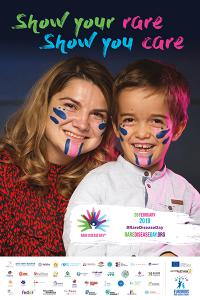Early Diagnosis for Rare Diseases #ShowYourRare #RareDiseaseDay
1 in 20 people will live with a rare disease at some point in their life, and 50% of these are children. Despite this, there is no cure for rare diseases.
Lack of information and knowledge on each disease often results in a delay in diagnosis, and the need for appropriate quality healthcare engenders inequalities and difficulties in access to treatment and care; often resulting in heavy burdens on patients. Due to the broad diversity of disorders and relatively common symptoms which can hide underlying rare diseases, initial misdiagnosis is common. In addition, symptoms differ not only from disease to disease but also from patient to patient suffering from the same disease.
These problems can be addressed with ANCON Medical’s Nanoparticle Biomarker Tagging (NBT) technology. Designed specifically with the goal of early diagnosis and disease differentiation in mind, NBT is the ideal technology to fit with the EURODIS campaign, offering non-invasive detection of an array of diseases through a simple breath test.
At just a fraction of the cost of current methods, the NBT can identify diseases and viruses within minutes. With early and fast identification, unnecessary testing, worsening symptoms and patient burden can be reduced and result in a greater probability of potential recovery, less suffering, and often less expensive and less intensive treatment.
NBT technology was developed for early detection by identifying “biomarkers” in a breath, which are DNA-protein controlled volatile organic compound (VOC) metabolites specific to individual diseases. These VOCs are the “fingerprints” of disease and NBT is far more sensitive than current screening methods. Whereas similar technology can require a concentration of thousands of biomarker molecules to detect the presence of a disease or virus, the NBT can detect concentrations as small as a single molecule.
“Researchers have discovered biomarkers for more than 400 diseases, with lung and other cancers among those, and being programmable makes an ANCON Medical NBT device quite versatile,” said Wesley Baker, CEO of ANCON Medical. “With funding and further investment, it will be used to screen for a wide variety of diseases like cancer. NBT is a much better alternative than other early diagnosis technology such as CT scans and far cheaper too. It can screen a wide range of at-risk individuals, allowing doctors to provide a fast, affordable and non-invasive way to discover the presence of pathologies at an early stage.”
In the EU, as many as 30 million people may be affected by one of over 6000 existing rare diseases: 80% have identified genetic origins whilst others are the result of infections, allergies and environmental causes, or are degenerative and proliferative. Since Rare Disease Day was first launched by EURORDIS and its Council of National Alliances in 2008, thousands of events have taken place throughout the world reaching hundreds of thousands of people and resulting in a great deal of media coverage.
For more information on Rare Disease Day and to join the call-to-action, visit https://www.rarediseaseday.org
Further information:
ANCON Medical NBT technology research: https://anconmedical.com/nbt-technology
ANCON Medical disease screening: www.anconmedical.com/disease-screening
Joanna Stephens
ANCON Medical
+44 1227 811705
email us here
Legal Disclaimer:
EIN Presswire provides this news content "as is" without warranty of any kind. We do not accept any responsibility or liability for the accuracy, content, images, videos, licenses, completeness, legality, or reliability of the information contained in this article. If you have any complaints or copyright issues related to this article, kindly contact the author above.



